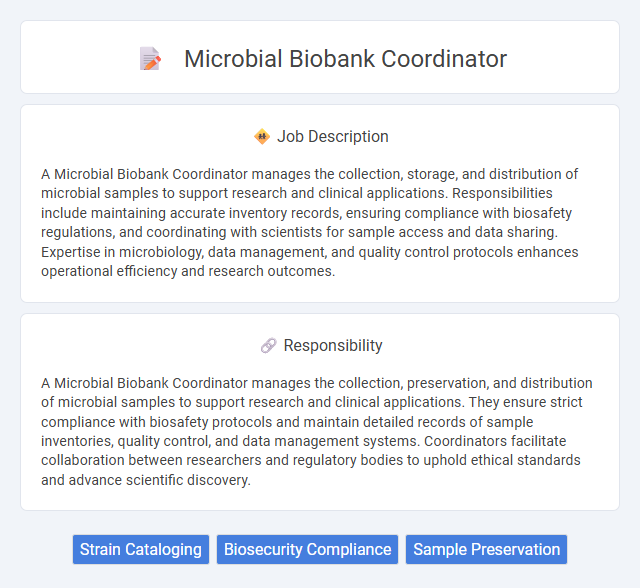
A Microbial Biobank Coordinator manages the collection, storage, and distribution of microbial samples to support research and clinical applications. Responsibilities include maintaining accurate inventory records, ensuring compliance with biosafety regulations, and coordinating with scientists for sample access and data sharing. Expertise in microbiology, data management, and quality control protocols enhances operational efficiency and research outcomes.
Individuals who are detail-oriented and possess strong organizational skills may likely find the role of a microbial biobank coordinator suitable, as it often requires meticulous record-keeping and sample management. People comfortable working in laboratory settings and handling biological materials with strict adherence to protocols will probably adapt well to the job's responsibilities. Those with high levels of patience and consistency may be better suited, while individuals prone to stress from repetitive tasks might find this position less compatible with their work style.
Qualification
A Microbial Biobank Coordinator typically requires a bachelor's or master's degree in microbiology, biotechnology, or a related life sciences field, with strong expertise in microbial taxonomy and strain preservation techniques. Proficiency in laboratory management, data documentation standards, and regulatory compliance (such as biosafety and bioethics) is essential for maintaining diverse microbial collections. Experience with cryopreservation methods, molecular biology tools, and inventory management software ensures accurate tracking and quality control of microbial samples.
Responsibility
A Microbial Biobank Coordinator manages the collection, preservation, and distribution of microbial samples to support research and clinical applications. They ensure strict compliance with biosafety protocols and maintain detailed records of sample inventories, quality control, and data management systems. Coordinators facilitate collaboration between researchers and regulatory bodies to uphold ethical standards and advance scientific discovery.
Benefit
A role as a microbial biobank coordinator likely offers significant professional growth opportunities through managing diverse microbial collections, enhancing expertise in microbiology and data management. This position may provide exposure to cutting-edge biotechnological research, facilitating collaboration with scientists and improving project coordination skills. Access to advanced laboratory resources and contributing to global scientific databases could also be potential benefits of the role.
Challenge
The role of a microbial biobank coordinator likely involves managing complex collections of microbial strains, which presents the challenge of maintaining sample integrity and preventing contamination. Coordinators probably face difficulties coordinating between various research teams and ensuring compliance with stringent regulatory standards. Meeting strict timelines for sample processing and data management could frequently require effective problem-solving and multitasking skills.
Career Advancement
Microbial biobank coordinators manage the collection, preservation, and documentation of microbial samples essential for research and clinical applications, offering expertise in biotechnological methods and data management. Career advancement opportunities include roles such as senior biobank manager, microbiology lab director, or specialized research scientist, with potential growth in biotechnology firms, pharmaceutical companies, and academic institutions. Developing skills in bioinformatics, regulatory compliance, and project leadership significantly enhances prospects for higher-level positions within the microbial biobanking and life sciences sectors.
Key Terms
Strain Cataloging
A Microbial Biobank Coordinator specializing in strain cataloging manages the accurate identification, classification, and systematic storage of microbial strains. This role involves maintaining detailed records using advanced database systems to ensure traceability and accessibility of microbial resources. Expertise in taxonomy, bioinformatics tools, and quality control protocols is essential to support research and biotechnological applications.
Biosecurity Compliance
A Microbial Biobank Coordinator ensures strict adherence to biosecurity compliance by implementing protocols for the safe handling, storage, and transport of microbial specimens within the biobank facility. This role involves continuous monitoring of biohazard risks and maintaining detailed documentation to meet regulatory standards such as those set by the CDC and WHO. Proficiency in risk assessment and coordination with biosafety officers is essential to uphold secure biobanking operations and prevent contamination or unauthorized access.
Sample Preservation
A Microbial Biobank Coordinator specializes in managing the collection, storage, and preservation of microbial samples to ensure their viability for long-term research use. Expertise in cryopreservation techniques, including the use of liquid nitrogen and ultra-low temperature freezers, is essential to maintain sample integrity and prevent contamination. The coordinator implements strict quality control protocols and monitors storage conditions regularly to prolong the lifespan of microbial cultures and genetic material.
 kuljobs.com
kuljobs.com